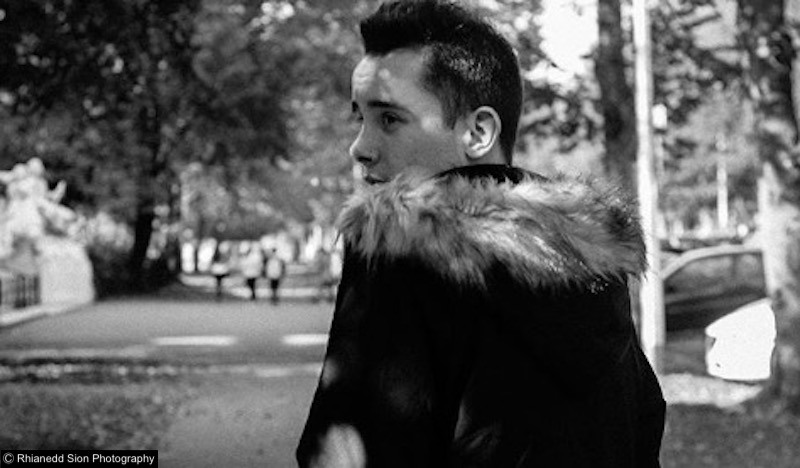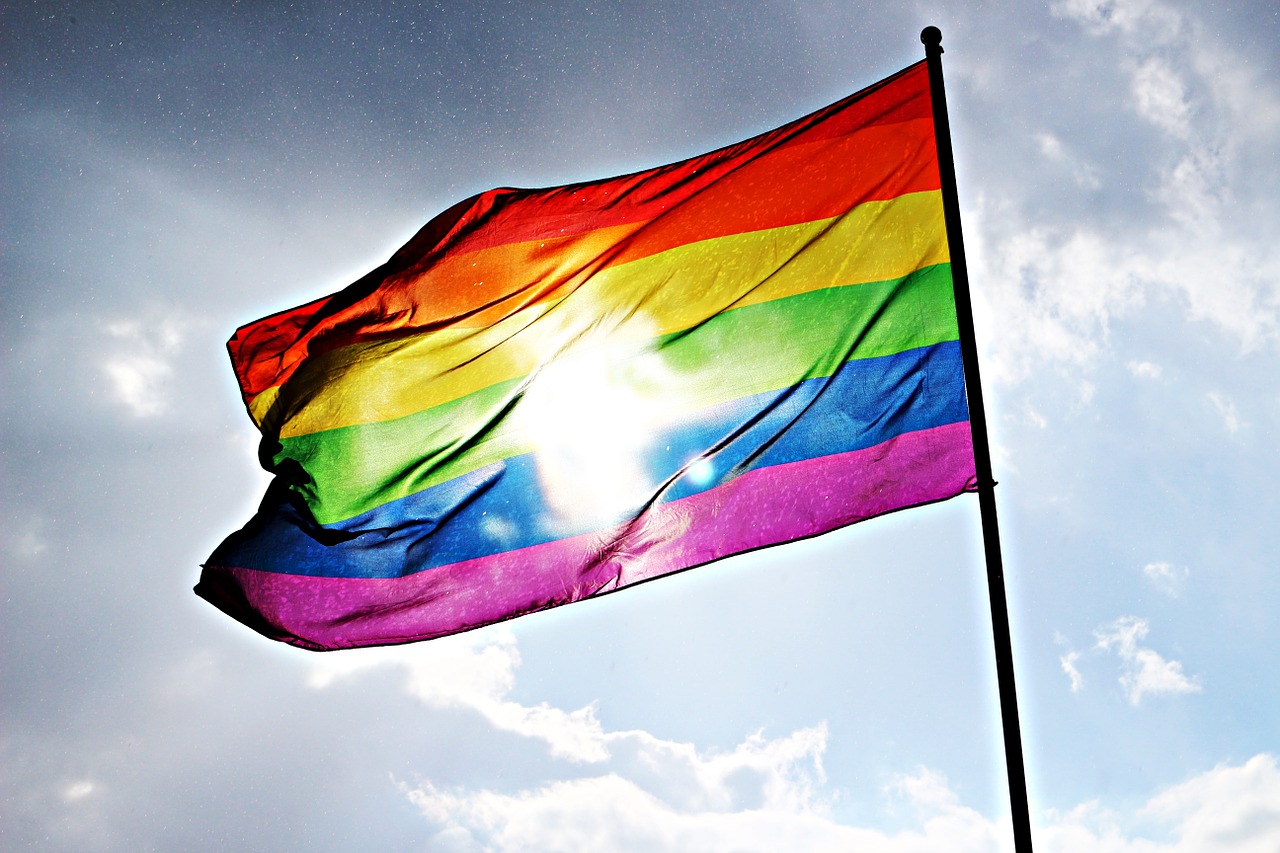As I drive through the Welsh town of Pontypool I’ve lived in since I was born, with a population of approximately 36,000 people, I’m surprised to see a rainbow flag flying high outside the civic centre in the middle of the town. It’s LGBT history month, but the flag doesn’t just stay up during February. Instead, it has become a permanent feature, flying proudly with the Welsh flag and the European Union flag.

Whilst the future of the flying European flag is uncertain, the rainbow flag is there to stay. In this tiny Welsh town, it is almost historic. I’m a 23-year-old Welsh boy that struggled with coming to terms with my sexuality.
Wales’ track record of LGBT rights is a little bit hazy, but in 2018 The National Assembly for Wales was recognised as the top employer in Wales for LGBT employees. This sort of movement is quite a good sign of how Wales has changed over the years. We have gay clubs that are thriving, venues that host drag queen shows, and the smaller towns are beginning to accept what is normal. Just last year, Newbridge Memorial Hall hosted a drag queen event.
Growing up gay in Wales, I found it incredibly difficult. The town I live in is rather behind the times: we have poverty, we have more empty shops than booming ones, and the people who live here are rather set in their ways. We’re a country run mostly by Labour, yet my area voted leave, and many conversations I hear are in support of a Tory government and a hard Brexit.
As I grew up, the rather cliché saying of ‘knowing I was different’ rang true. I didn’t get along with ‘the lads’. I’d rather stand on the railings singing Girls Aloud – mainly Nicola’s lines; I was always Nicola – than play football. I got taunted for being a ‘girl’.
It hurt, but being young I didn’t really know what that meant. Then, through secondary school, I experienced almost daily taunts of ‘gay boy’, ‘faggot’ and ‘bender’. As puberty kicked in and feelings for guys intensified, so did the bullying, as hormones raged in every teenage boy in school, and the idea of a ‘queer’ being anywhere near them repulsed them. I remember experiencing comments from teachers. PE teachers would always treat me like a stereotypical ‘gay boy’ that would rather be brushing my hair than learning the rules of football. I remember a few of my PE classmates disappearing for a class to go on a drama trip. To snickers from the rest of my class, my teacher said, “so all the poofs have gone off to watch show tunes.”
No one blinked an eye at this comment.
Lisa McNally is a mother from Cwmbran, South Wales. She witnessed her son, Lewis, now twenty years of age, experience homophobic bullying. She agreed to talk to me to discuss her son’s bullying, as she thought it was important that parents who are aware of their children’s sexuality should be there to support them. “I have a son who grew up in Cwmbran and attended the local comprehensive school. He endured daily abuse from his peers and from the teachers. When I attended the school, I was informed by several teachers that Lewis should not tell people he was gay, and that he wouldn’t be bullied.”
When Lisa questioned why such a comment had been made, the teachers told her that her son would not be received well in the community. “I was told to remember that Cwmbran was still a village and ‘forcing the gay agenda’ wasn’t warmly received.”
“I have walked through school with Lewis to chants of ‘faggot’, ‘gay boy’, ‘bummer’, and I have endured this when walking through the town centre with Lewis, too. He ignores them. I found it hard to do so.”
Such was the regularity of her son’s bullying that Lisa visited the school Lewis attended in the hopes of stopping his heavy bullying. “I have walked through school with Lewis to chants of ‘faggot’, ‘gay boy’, ‘bummer’, and I have endured this when walking through the town centre with Lewis, too. He ignores them. I found it hard to do so.”
Lisa notes, however, that when the pair shopped in Cardiff, there were no comments and barely any stares from the people in the city centre. It paints an image that whilst city centres were more forward thinking, small Welsh towns were still very much being left behind. Due to Lewis’ bullying, he dropped out of school and left with no education. Lisa described that her son felt suicidal, and whilst better now, he did suffer with depression. Lewis said that ‘being made to go to school every day’ made him feel vulnerable, and his experience was a ‘living hell’.
Once I was out of school, like Lewis, I began to accept who I was and embrace it. It wasn’t until I started working as an eighteen-year-old that I was confident to admit that feelings for guys were there. I began by admitting to my friends. Yet I was still afraid of declaring that I was gay; the liberation of saying I liked both sexes was a step in the right direction.
Matthew Cleverly, an actor originally from Pontypool but moved to London to study, realised he was bisexual when meeting a group of like-minded individuals. Being in the same year as me in the same school, Matthew and I observed the treatment of those individuals that did ‘come out’. ‘Looking back I remember a few of my friends coming out as LGBTQ+ and although some were accepted by friendship groups and families relatively easily, others were harassed, bullied and rejected.’
Matthew reflects that as he grew up in the Welsh valleys, he suppressed a part of himself. “I didn’t grow up queer in Wales. It was only after I moved out that I realised what was always there. I’d moved to London to go to drama school, and was also, at that point in a four-year relationship with a girl. It wasn’t until I was given the freedom to move away from the judgement of a small-town, Welsh community, and was thrust into a supportive, creative environment, in which I had to constantly self-analyse, that I began to discover and accept the other side of myself.
“I realised that I had taken the path of least resistance my whole life,” Matthew continues. “And although the relationships I had were real and loving, I hadn’t been fully there because I was always concealing a piece of myself – even from myself.”
Matthew believes that part of his reasoning for not acknowledging his bisexuality was because of a lack of LGBT role models. ‘Not having strong queer role models definitely aided in me not coming out for so long. In a place such as small-town Wales, feeling different can be so much more isolating, because you can’t see anything beyond your circumstance. It’s important to remember that although you may feel you’re not in the right place now, you will find your tribe eventually, and they will love you for exactly who you are.’
Finding my own tribe was a key feature in my acceptance. Some of my best friends were also ‘experimenting’ with the same gender, and being able to talk honestly to people after so many years of hiding feelings was like a freedom movement.

At eighteen, I began to go out on the nightclub scene. In the town of Newport, I’d regularly have a group of same-dressed looking boys glaring at me from across the dance floor as I dared sing along to Miley Cyrus. I’d have people double take when they saw me kiss a man. Going out on nights out in my hometown was a whole other story. When waiting at the cash point one night, stood alone and not doing anything remotely attention seeking, a guy across the road shouted at me, “OI, FAGGOT!” Mature and annoyed by this, I turned to leave. But he wasn’t done. He shouted, “Yeah, that’s right. Fuck off before I punch you.”
At the same time, I discovered Cardiff’s gay scene. With new friends, I would go out and play the field. Cardiff was a lot more liberating than that of Pontypool or Newport.
Jennie Scrivin, from Pontypool, found solace in Cardiff’s gay scene when she was discovering that she was a lesbian. “There wasn’t a lot of gay people when I was growing up. Coming out was hard. Would I be accepted? I’d spend every night out on the gay scene, but that was in bigger cities, not my little town. I felt like I finally fitted in.”
At eighteen, Jennie came out and is now in a relationship. Older, and out, Jennie remarks that attitudes are beginning to change. “It’s not a taboo word anymore. I just hope it continues to become more and more accepted.”
I have to stress that growing up during my teenage years, I really did find it difficult to come to terms with who I was. I turned to a blade to keep my emotions at bay, and to cope with who I was I regularly sought solace in online webcam sites, where there were men and teenagers like me that felt the same. As I got older, I accepted who I was. I soon admitted that I was gay, rather than bisexual, and when I told my parents, they really couldn’t care less. I think my dad nodded and then said, “What do you want from the chip shop?”
Small Welsh towns still have a lot to do to promote inclusivity. When working in a pub in the town in 2016, I would regularly hear homophobic slurs. To the people saying them, they were just jokes. But to a gay bartender who had overheard, I had to bite my tongue. To promote inclusivity, Welsh towns could support those who are growing up gay that may feel afraid to tell anyone who they are. When I was younger, there were no support groups. Whilst I suspect many older adults such as teachers realised I was gay before me, I was never questioned on it in a nice way or made to feel like I could talk to someone about how I felt.
Yet every time I drive past the rainbow flag in the centre of my small town, I feel that sense of pride. I remember that there are people there that accept me for who I am and that flying a flag of many colours not only represents the gay people in my town, but the lesbian, bisexual, transgender and the queer community.
A small Welsh town that I call home is opening their arms and embracing change, and that is something we must all support.
Opinions expressed in this article may not reflect those of THEGAYUK, its management or editorial teams. If you'd like to comment or write a comment, opinion or blog piece, please click here.


